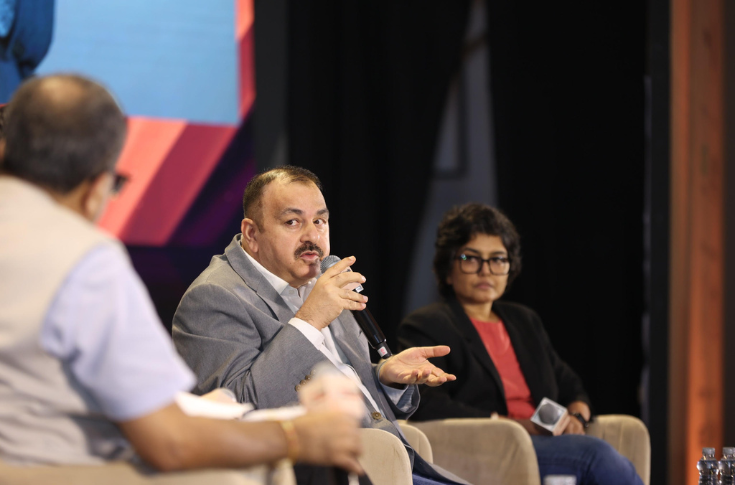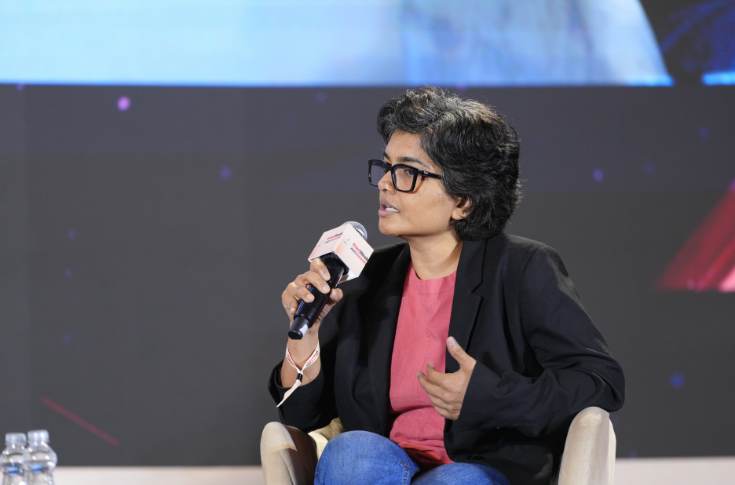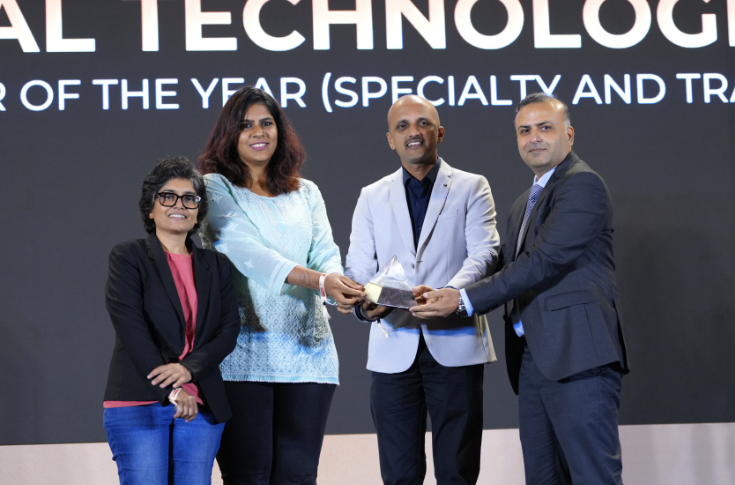PrintWeek Awards: Printed books need a better speed to market strategy
The knowledge session at PrintWeek Awards 2025 focused its attention on Indian publishing. A deep-dive into how printed books are reshaping the world, with Ajay Joshi of Penguin Random House, Dr Amit Sharma of HarperCollins and Priya Singh of Hachette India, with Ramu Ramanathan, editor of PrintWeek and WhatPackaging? moderating the discussion.
15 Oct 2025 | By Jiya Somaiya
Post-Covid book boom
The discussion began by addressing the resilience of printed books. Ajay Joshi noted that while the pandemic caused damage across many industries, a major positive was a global increase in reading. He attributed this to people spending more time at home. This led to a “great shift in India” towards a stronger reading culture.
Dr Amit Sharma supported this view, stating that the human habit of “reading and acquiring knowledge” remained intact; it was the method of business that changed.

Dr Amit Sharma, director - publishing operations, HarperCollins
Dr Sharma said, “Let’s understand the evolving book ecosystem to know why we say this. India is one of the largest English content consumers, with a big aspiring population investing in professional knowledge and education.” He added, “Rising regional identities giving rise to regional language content consumption, influence of social media induced spikes giving opportunities, quick publishing need due to faster knowledge sharing in an ever-connected world, customisation across all segments, especially school education books for exclusivity and protecting commercial interests (earlier it was seen only in vanity publishing).”
The times they are a-changin’: From stock to speed
The traditional model of printing large volumes for stock is giving way to lean processes driven by external market pressures. Dr Sharma alluded to the challenges of rising inventory costs and losing opportunities due to slow response, like production costs, cashflow problems, and price sensitivity, which put profitability under immense pressure. This, as Dr Sharma and Ajay Joshi said, publishers, printers, and distributors need to make our processes leaner and faster. This will help the business produce what is required, in near exact quantity, in time, and closer to demand, with trust (content data safety with ease of portability, especially while handling content of foreign publishers), as per the end customer’s need (customisation).
The importance of lean processes and speed was repeatedly stressed. This, the panellists said, would help reduce cost pressure on the complete value chain, help boost actual sales, and improve both top and bottom line. Dr Amit Sharma noted that the demand for lean processes comes from the threat of losing sales opportunities if publishers “do not publish faster.” Publishers are now seeking partners who invest in “hybrid technologies,” combining conventional and digital printing capacity to achieve this speed.
Priya Singh detailed how Hachette navigated these challenges through its robust, decade-long partnership with Manipal Technologies (MTL). She explained that the geographical distance between Hachette’s Gurgaon office and the Manipal printer was transformed into a logistical strength by setting up an end-to-end service where books are shipped directly from the printer to the customer.

Priya Singh, senior vice president - production, digital resources, and press logistics, Hachette India
“Time-to-market is one of the biggest constraints faced by publishers, and that decision solved that problem,” Singh said, adding that the goal was to keep “unsupplieds under check.” This collaborative model — which she described as India’s first fully integrated end-to-end service facility with a printer — required a leap of faith and a simple communication structure, moving beyond the traditional publisher-supplier dynamic.
Ajay Joshi echoed this sentiment, arguing that less printing matched to market demand is better for managing costly inventory. He stressed that print-on-demand (POD) and digital print now play a major role in finding the “balance between these two main parameters of the overall supply chain.”
The All About Book panel touched upon the quality of Indian book manufacturing, with Singh citing the successful, high-volume, low-print-run Yellowback series — over 300 titles with a consistent design—as proof of domestic manufacturing capability. Singh said, “The signature yellow colour comes from its legacy imprint; and what is interesting is that this entire project was driven by the production team — everything from content sourcing and typesetting to cover design — with Thomas Abraham overseeing it closely, and then Manipal Technologies taking it all the way to print. Getting such a big series out while keeping the design language consistent was honestly a nightmare at times, but MTL executed it perfectly, and it is been hugely appreciated."
Sustainability at the forefront
Joshi shared that Penguin Random House is the first trade book publisher in India to voluntarily register with the Central Pollution Control Board (CPCB) for plastic usage reporting. He stated that the company is aiming for “zero plastic emission in the supply chain,” which involves replacing plastic with bio-renewable or recyclable materials. This effort included adopting a carton sealing machine to eliminate the use of plastic tape for outward dispatch.

Ajay Joshi, group vice president - supply chain and production (India and Southeast Asia), Penguin Random House
The shift extends to the fundamental input: paper. Joshi challenged Indian paper mills to develop a 100% recycled, local paper that can replace imported virgin stock. He pointed out that even certified international paper still carries a carbon cost due to logistics.
The environmental commitment also covers supply chain emissions. Joshi is engaging with vendors on Scope 3 emissions, discussing replacing fossil fuel logistics vehicles with electric alternatives to reduce the company's external carbon footprint. Joshi spoke about how the book publishing major has, with the help of a case sealer from Stelda to convert BOPP tapes to hot glue. He mentioned how there were savings on strappings and BOPP tape rolls ever since we shifted to the case-sealer. He mentioned how, in addition to utilising recycled paper, the group has reduced the use of plastic in our supply chain.
Singh remarked that the days of the traditional supplier relationship are over, urging printers to work as partners to ensure both sides of the business grow together. The discussion concluded with Dr Sharma highlighting the burning issue of piracy when he said, “This is the need of the hour. The industry can adapt technical means like holograms and tamper-proof labels, collaboration with retailers and distributors, and more and more consumer awareness programs to make all readers aware of the effects of piracy.”
Some of the themes that resonated during the panel discussion were the need to be future-ready. Short runs of many titles instead of the conventional approach of mass production of a few titles, and a balanced mix of standardisation and creativity, plus risk-sharing.
The All About Books panel was powered by Bindwel Technologies.
Priya Singh: The Hachette-MTL partnership

It has been quite a journey. One that began with a bit of a leap of faith. MTL’s entry into trade books and Hachette’s own expansion in India happened around the same time, so we sort of built this partnership from scratch. There was a huge geographical gap between Gurgaon and Manipal, but we turned that into a strength. Instead of bringing books to our warehouse, we set it up so that everything is shipped directly from Manipal to our customers, and that completely altered our turnaround time. Without this, it would not have worked. Obviously, time-to-market is one of the biggest constraints faced by publishers, and that decision solved that problem.
At Hachette India, we pre-plan our year and make sure that the supply of our core list is never affected by anything – it is something we work on closely to make it possible with a clear view of keeping the supply under check. We have done this for a decade. The system has been super successful.
The third (or in fact the very first one) is the workflow constraint of how our bulk of the business is largely EPZ, and a solution to this constraint — doing that large business locally more and more has resulted in being able to sell more of those books, which buying directly from the United Kingdom would be very limiting both in terms of time and cost.
Of course, it was not smooth sailing all the way. There were many challenges, and we had to think through every single one carefully. But once the approach was clear, the team at MTL implemented it exactly the way it needed to be done quickly, accurately, and with full ownership. They adapted to every new requirement and were always ready to find solutions rather than problems. Their tech capability and responsiveness have been huge strengths in making this work.
Another thing that helped was keeping the communication simple. I am the single point of contact for everything related to Hachette, so nothing gets stuck in layers. We discuss, decide, and move.
In the end, a system is only as good as the people behind it, and I have to say, this collaboration has been exceptional. What started as an experiment has now become India’s first fully integrated end-to-end service facility with a print firm, covering everything from printing and binding right up to last-mile delivery. It is efficient, it is reliable, and it is how we envisioned it at the start.












 See All
See All